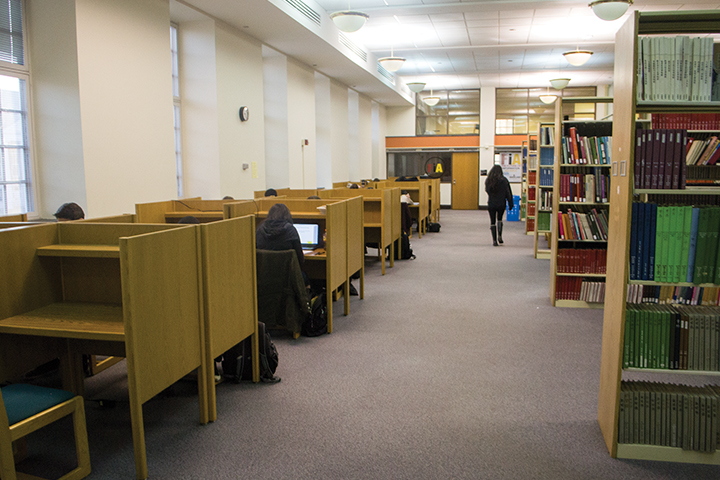
McKeldin Library’s fourth floor
This university’s libraries received a $290,000 grant from the National Endowment for the Humanities to extend their project of digitizing historic Maryland newspapers.
This is the second NEH grant for the digitizing project. The libraries have been working on the project for about two years, with their first grant approved in late 2012, according to a university news release.
The project will work on 100,000 pages of newspapers printed in the state from 1836 to 1922, which will be available online free of charge. The libraries will have two years to digitize the pages, according to the release.
Among the major papers selected were the Frostburg Mining Journal, the Cecil Democrat and the St. Mary’s Beacon.
“The newspaper selection is not finalized yet,” said Allison Rein, the director of the Maryland Newspaper Project at the Maryland State Archives. “We are still going through the shortening process.”
The papers were selected by surveys and assessments conducted by the advisory board. The papers also had to meet requirements from the Library of Congress, which Rein said helped with the selection process.
Jennie Knies, the principal investigator of the grant and manager of the Digital Programs and Initiatives at this university’s libraries, said that they worked with the State Archives in Annapolis and the advisory board, which included experts on the state’s history.
The digitizing will come from microfilm copies of the newspapers and not the original papers themselves, Knies said.
The microfilms, which are available to see at McKeldin Library, carry shrunken photographs of copied documents. The digitizing process consists of rolling the film onto the microfilm reader.
“It’s awkward and time-consuming to use,” Knies said. “We prepare them and send them to our vendor to make different types of digital copies.”
Another feature provided once the papers are digitalized, Knies said, is the optical character recognition, which allows people to search for certain words in the papers.
Patricia Steele, the dean of libraries at this university, said microfilming provides an exciting and revolutionary opportunity for libraries, as digitizing them will be useful to researchers and the public.
“It’s very valuable to researchers,” Steele said. “What a neat way to look back at how things were like. People can look back at how war and immigration was during the time period.”
“It’s a blessing,” Steele added.
The historic newspapers don’t have copyrights, Steele explained, so the libraries did not have to take permission to use copies of the papers.
Steele said the libraries at this university will oversee the process and will work with the vendors to ensure that the costs don’t exceed the grant total.
Once completed, the Library of Congress will get one copy and this university will keep another.
Digitized newspapers from across the country can be viewed online in the Library of Congress database “Chronicling America: Historic American Newspapers.”



